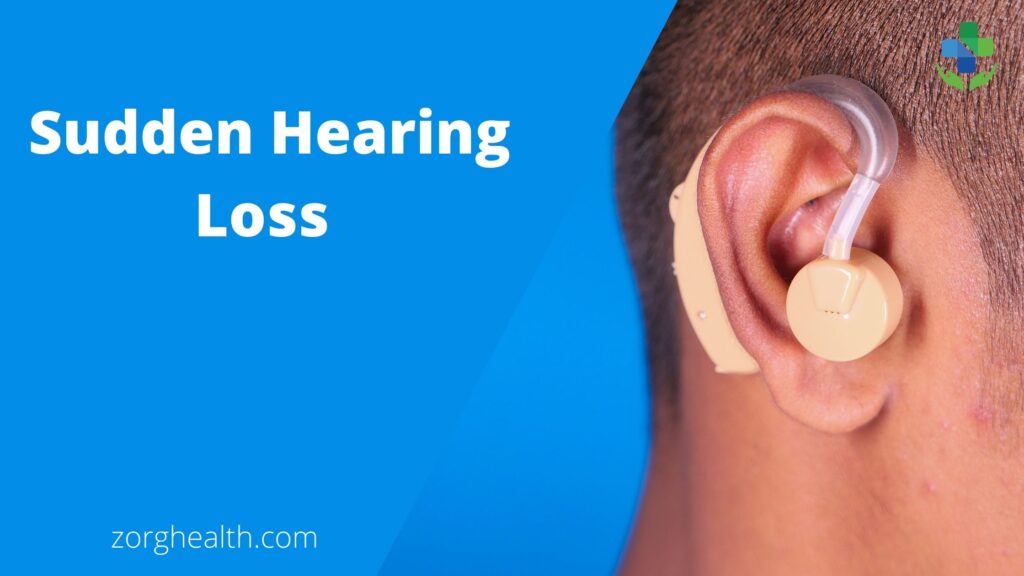Many old-aged people experience a gradual decline in hearing, and it is a fairly common problem—a natural consequence of aging. But if the hearing is significantly deteriorating suddenly then it is a sudden hearing loss, a condition called Sudden Sensorineural Hearing Loss (SNHL) that causes you to lose your hearing all of a sudden in one or both ears.

Sudden hearing loss can happen to anyone. Usually, sudden hearing loss doesn’t always happen all at once, even though the name ‘sudden hearing loss’ implies it. Generally, it starts in just one ear without completely losing the ability to hear.
One may lose hearing all at once or take a few days to develop— typically within 72 hours. Sometimes hearing returns on its own or partly hearing returns with treatment. Sooner the treatment, usually better the outcome to prevent permanent hearing loss.
Consequences of Sudden Hearing Loss
Sudden hearing loss isn’t a life-threatening condition; however, it can significantly affect the quality of life by interfering in the ability to easily communicate with the world. This could lead to feelings of initial shock, fear, isolation, depression, and related self-esteem issues.
Hearing loss doesn’t just affect physically but often significantly impact mental health. Hearing loss can have a significant impact on cognitive ability.
Sudden hearing loss is more commonly observed among people in their 50s and 60s. This type of hearing loss disrupts the brain’s ability to interpret sound.
Degree of Sudden Hearing Loss
Depending on the degree of impact, sudden hearing loss can range from the following:
- Mild hearing loss: Hearing loss between 26 to 40 decibels.
- Moderate hearing loss: Hearing loss between 41 to 55 decibels.
- Severe hearing loss: Hearing loss of more than 71 decibels.
Causes of Sudden Hearing Loss Sensorineural
The cause of sudden deafness varies.
Sudden hearing loss is generally caused by dysfunction or some damage to the inner ear structures, damaged hair cells in the cochlea, auditory nerve; in one or both ears that have a quick beginning.
It can also be triggered by long-term exposure to the loud noise of high-frequency sounds that damages hair cells to an irreplaceable extent.
According to a study, heart risk factors, inflammation, and bone demineralization may each contribute to the association between weakening bones and quick loss of hearing.
Some other reasons for sudden hearing loss may be-
- Excessive ear wax
- Eardrum burst or ruptured eardrum
- Ear infection (fluid build-up, flu)
- Eardrum hole
- The foreign object struck the in-ear canal (big bug)
- Aging (presbycusis)
- Ototoxic medication (which can harm the ear)
- Malformation of the inner ear
- Venom from a snake bite
- Blood circulation problems
- Immune system disease (Cogan syndrome)
- Occupational noise (heavy equipment, farming machines)
- Blood vessel disease
- Neurologic conditions (multiple sclerosis)
- Meniere disease (affects inner ear)
- Lyme disease (transmitted through a tick bite)
- Congenital deformities (present at birth)
- Brain damage (or head trauma)
- Sudden air pressure changes
- Chemotherapy
- Genetics
- Illness (from virus or bacteria)
- Cholesteatoma (skin lump in-the-ear)
- Otosclerosis (bone formation in the middle ear)
A recent development is that Sudden hearing loss could be a rare side effect of COVID-19 for some people. Some particular types of cells in the lungs and blood that the coronavirus attacks, have been found in similar cells in the middle ear.
Symptoms of Sudden Hearing Loss
The seriousness of hearing loss varies. Many people first notice sudden hearing loss upon waking or talking phone hear a loud “pop” before they lose their hearing.
During this time, the sound gradually becomes garbled or muted. A normal speaking voice may sound like a whisper or crowd conversations can be hard to hear. Even loud sounds may seem muffled, particularly difficulty in hearing and understanding children’s and female voices.
Some people struggle to hear conversations with background noise or can’t hear people unless they are speaking loudly.
Following are some of the initial signs and symptoms of sudden hearing loss that you may have:
- Muffled sounds or voices
- Spurts of dizziness or balance problems
- Ringing in the ears
- Pressure in the ear
- Withdrawal from conversations
- Repeatedly asking others to speak more slowly, clearly, and loudly
- Frequent need to turn up the volume of the television or radio
- Avoidance of some social gatherings
Treatment of Sudden Hearing Loss
Once the cause of sudden hearing loss is detected and confirmed, the doctor will suggest the line of action. This is often a reversible phenomenon, and the treatment can be simple. But one certain thought is early treatment improves your chance of regaining more of your hearing.
The recovery is more comprehensive among people who experience either high- or low-frequency hearing loss, unlike those whose hearing loss is across all frequencies. There are comparatively lesser chances of recovery for older adults or those with vertigo.
Steroids are usually the common treatment to reduce inflammation and swelling for sudden sensorineural hearing loss. The doctor can also prescribe antibiotics if an infection is the cause of your sudden hearing loss. There can be a possibility of a surgical repair as well, if required, depending on the cause. Oral steroids, intratympanic steroids (injecting through eardrum), and hyperbaric oxygen (sitting in a pressurized oxygen chamber) are the three main modalities of managing Sudden Sensorineural Hearing Loss.
Newer technologies and advances in the technology of hearing aids and cochlear implants are helping to get communication for people affected by hearing loss.
Apart from medicines, the support system of family, friends and a therapist surely ease the mental and emotional effects.
Beyond a specific time window, hearing loss could become irreversible. Sign language and lip reading can contribute to improving communication for people with severe hearing loss.
Tips to avoid noise-related hearing loss
- Protect your ears from high decibel noise and foreign objects
- Take regular hearing tests to keep a watch
- Avoid recreational activities like rock concerts or using power tools
- Turn down the TV or headphone volumes
- Wear plastic earplugs or glycerine-filled earmuffs around loud noise
The Bottom Line
Nerve-related hearing loss is a natural phenomenon of the aging process. However, sudden hearing loss is a serious medical condition and requires prompt medical attention.
No matter the cause of the sudden hearing loss, as soon as you notice symptoms it is crucial to consult the doctor.
In most cases, hearing loss is a treatable condition. Early detection is key. The sooner you pay attention to the symptoms of hearing loss, the more chances you have to avoid irreversible damage.
